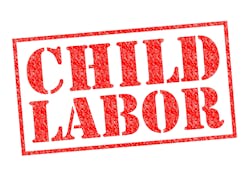EHS Professionals’ Role in Ending Child Labor
While many people perceive child labor to be an issue outside of the US, it occurs here as well. In 2023, the US Department of Labor reported that nearly 5,800 children were employed in violation of the law.
That represents an 88% increase since 1999.
“More alarming is a 26% rise in the number of minors performing hazardous jobs, such as operating meat processing or sawmilling machinery, conducting roofing or demolition tasks, or performing trenching and excavation work,” explains Pamela Walaski, president of the American Society of Safety Professionals (ASSP) in a recent letter.
This is an issue that safety professional needs to address says Walaski as she noted that recently ASSP issued a strong position statement opposing all forms of exploitative child labor practices.
On March 26, 2024, made the following statement:
ASSP opposes all forms of exploitative child labor practices. We call on governmental entities and nongovernmental organizations to combat exploitive child labor practices in the U.S. and around the world.
As part of this position, ASSP strongly supports:
- Regulation and legislation in the U.S. and other countries that prohibits and prevents exploitative child labor practice.
- Specific language in applicable global standards that opposes and facilitates prevention of exploitative child labor practice.
- Actions by our membership and occupational safety and health professionals on a global basis to establish and implement programs prohibiting exploitative child labor practices.
To address this issue ASSP recommends EHS professionals take the following actions:
Raise awareness. Share data, stories and resources about the impact of child labor to help educate key stakeholders.
Champion stronger laws. Advocate for stronger child labor laws and oppose efforts to weaken existing protections.
Promote safe workplaces. Help employers develop age-appropriate training, ensure proper supervision and enforce safety standards to better protect young workers from harm.
Promote ethical practices. Advocate for responsible supply chain practices that ensure child labor is not used in the production of goods and services.
